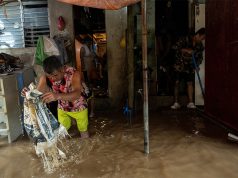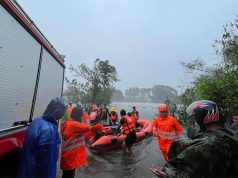The National Disaster Risk Reduction and Management Council has gotten the attention of people who think the disaster agency’s consistency in providing safety reminders is admirable.
NDRRMC is mandated to send text message alerts at regular intervals by Republic Act 10639 or “The Free Mobile Disaster Alerts Act” which was signed by former president Benigno Aquino III on June 20, 2014.
In the past few days, most have been amused by the agency’s consistent text alerts to the point that they have jokingly tweeted NDRRMC is the only one that cares for them.
Hi Tita, dati text ng anak mo laman ng inbox ko ngayon NDRRMC na lang
— Hi Tita (@HellooTita) June 11, 2018
Buti pa NDRRMC tinetext ako, sana ikaw rin
— doughboy (@RichardCruz09) June 11, 2018
Sweet naman ni NDRRMC pag gising ko may text agad galing sa kanya hihi
— Gweg ⚡ (@gregfcortez) June 12, 2018
Dear NDRRMC,
I appreciate you for reminding me every single day to take care of myself. You don't know how grateful I am to see someone texting me on my phone. No one texts me everyday for such a long time..
Sincerely,
Single Life😂😂😂😂
— Warrior of Christ (@WarriorPriMarie) June 12, 2018
A sample text from the agency looks like this:
di man ako tini-text ng NDRRMC at least may nakakaalala pa rin sakin ? i love you Emergency Alert ❤️ alam kong ako lang. esh-esh ? pic.twitter.com/KJcMppXsVm
— beng (@vinvinbugos) June 13, 2018
If the mobile phone is not in silent mode, the text alert is accompanied by a continuous alarm that rings until the sender has read it.
Disaster alerts mandate
With the help of the National Telecommunications Commission and private mobile phone service providers, the agency is supposed to inform people of natural disasters and calamities through text messages.
It is “to prevent injuries, destruction and loss of lives and property.”
Other relevant government agencies mandated to send alerts are the Philippine Atmospheric Geophysical and Astronomical Services Administration and the Philippine Institute of Volcanology and Seismology, among others.
According to law, people located near and within the affected areas are supposed to receive alerts. It added:
“The alerts shall include contact information of local government units and other agencies required to respond to the situation. The alerts may contain other relevant information such as, but not limited to, evacuation areas, relief sites and pick-up points.”

The alerts are supposed to be free of charge. They can also be in the form of multimedia messages or e-mails if “needed or appropriate.”
If the information sent through the alerts by an individual is deemed false or misleading, the sender can be jailed for two to six months and be fined between P1,000 to P10,000.
For corporations, they are penalized between P1,000,000 and P10,000,000. Their franchise would also be suspended by the government.
It was enacted after the disaster of super typhoon “Yolanda” (Haiyan), when people used social media as a means to locate their loved ones.










